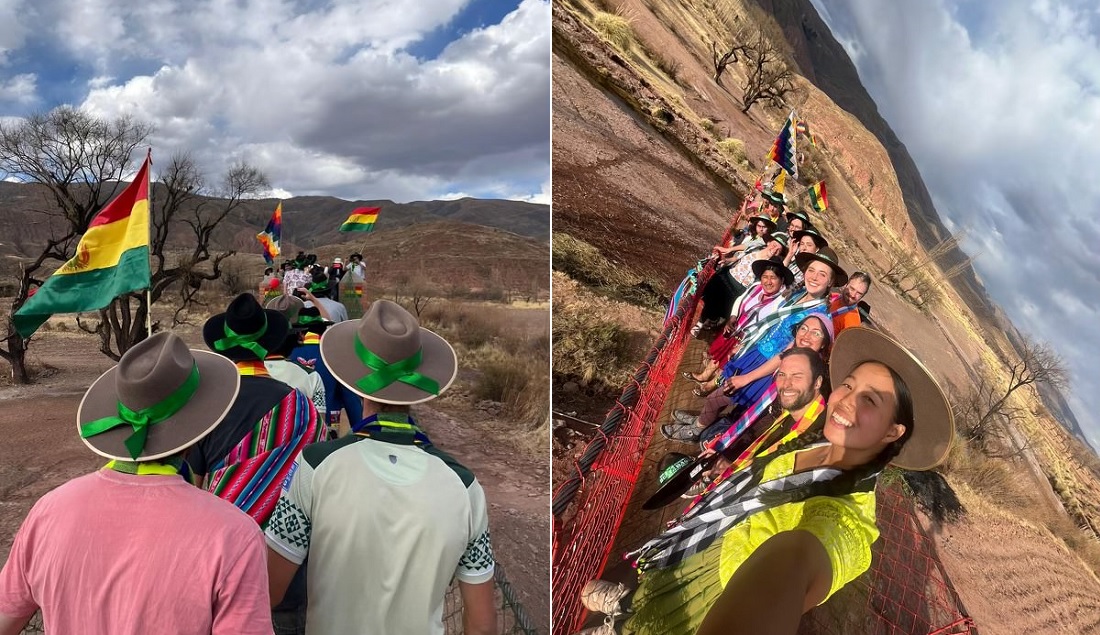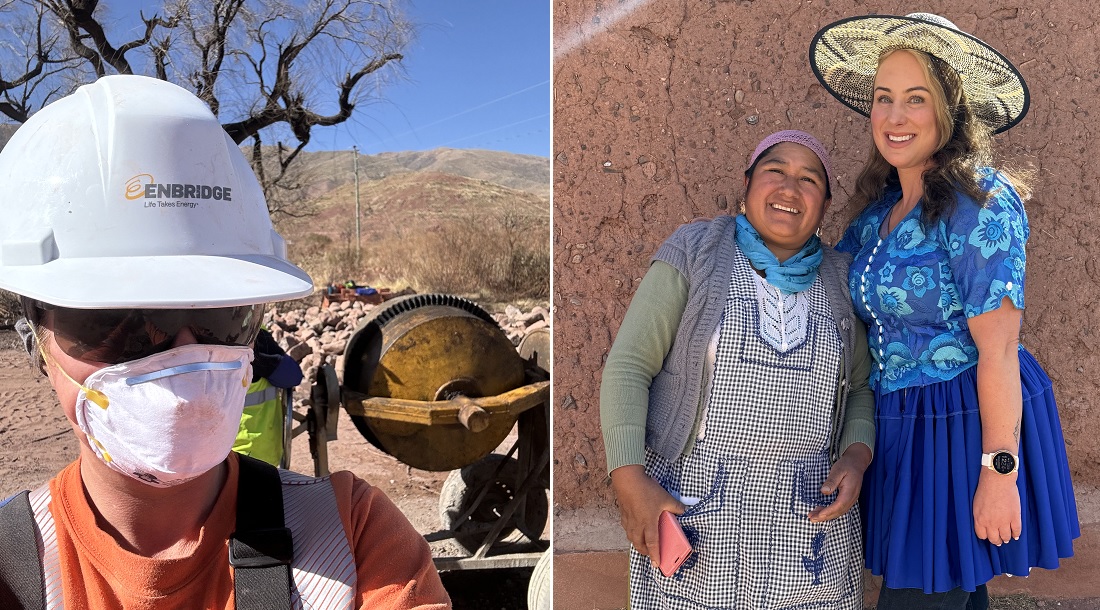When the winter rains come, rising waters in remote Huataraque block the rural Bolivian community’s access to the main road.
For four rainy months, each time the violent flooding occurs, families are divided, supply routes are blocked, and residents can’t get to school, markets or hospitals.
In 2022, a member of the community was swept away and lost his life while attempting to cross the water.
Without a solution, the community’s safety is continuously at risk.
Huataraque’s plight caught the attention of Engineers in Action (EIA). This non-profit organization works with volunteers from different backgrounds and industries, as well as engineering students, to build critical infrastructure—bridges and WASH (Water, Sanitation and Hygiene) projects—in underserved communities around the world.
 Villagers and Engineers in Action volunteers in festive clothing celebrate the opening of a 190-foot, or 58-meter, footbridge in Huataraque, Bolivia to improve the community’s safety and access to essential services.
Villagers and Engineers in Action volunteers in festive clothing celebrate the opening of a 190-foot, or 58-meter, footbridge in Huataraque, Bolivia to improve the community’s safety and access to essential services.
EIA’s bridge program alone has completed more than 110 footbridges in 12 countries since 2006.
Catherine Dumsday, an Edmonton-based operations engineer in Enbridge’s Liquids Pipelines business, heard about EIA from a former manager, who volunteered with the organization in 2023.
“I chose engineering because I wanted a career that would enable me to make an impact,” says Dumsday. “When I heard why the (Huataraque) site was selected, I knew it would drastically improve their quality of life.”
Inspired by Verbeek, Dumsday signed up to help EIA build a 190-foot, or 58-meter, footbridge to improve the community’s safety and access to essential services.
From October 2023 to June 2024, Dumsday worked on the Rio Pocoata Project with students from the University of McGill, the University of Illinois and the University of Washington, helping them learn skills in project management planning and bridge design.
Related links:
- Employee volunteering and giving at Enbridge
- Enbridge’s Fueling Futures program
- Fueling Futures across North America: See our 2023 interactive map
In early July, the group arrived in Huataraque for the build.
“The people live very, very humbly,” Dumsday says, noting the village is located more than 11,400 feet (3,500 metres) above sea level and three hours northwest of the country’s constitutional capital, Sucre.
“They grow a lot of their own food. They farm. They didn't even have a washroom with shower; they built one for us to try to make us comfortable.”
Dumsday served as field engineer in charge, overseeing safety during the excavation, site layout and masonry phases.
“When we arrived, the community held a little ceremony for us,” she remembers. “Most of them were crying, telling us how much it meant that we were there to support them. It was very humbling.”
Both mentors and students are responsible for paying their own costs, including travel expenses.
Enbridge supports and encourages our employees to give back in ways that matter most to them. Through our Fueling Futures grants, employees can boost their giving by applying for donation matching in support of programs that align with our focus areas.
 Enbridge operations engineer Catherine Dumsday on the footbridge worksite, and in traditional Bolivian dress with a new friend in Huataraque.
Enbridge operations engineer Catherine Dumsday on the footbridge worksite, and in traditional Bolivian dress with a new friend in Huataraque.
Dumsday was awarded a $5,000 Fueling Futures grant, which she used to match donations from friends and family and leverage more support.
“Working for an organization that encourages volunteering and giving back made it easy for me to be able to do this,” Dumsday notes.
Her experience in Bolivia was nothing short of life-changing.
“The (community members) had so little, yet they were willing to share whatever they had,” she says.
The group faced some difficult moments—including altitude sickness and temporary highway blockades. But these made her time in Bolivia all the more unforgettable.
Dumsday adds, “The growth that came from this experience and how much it's changed my perspective on life—I got far more than I gave.”









